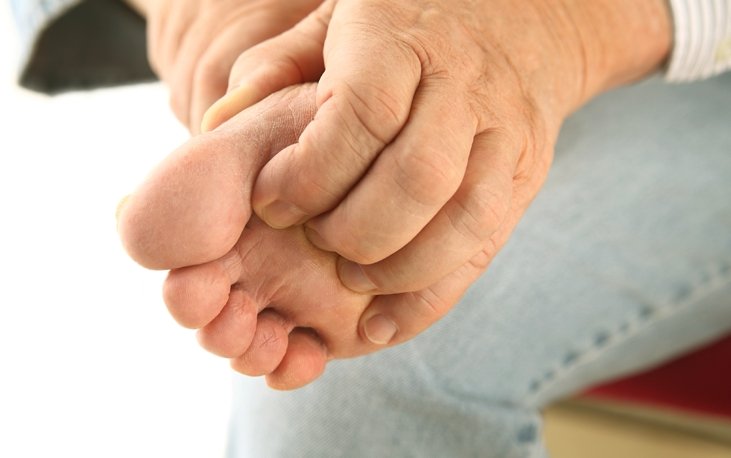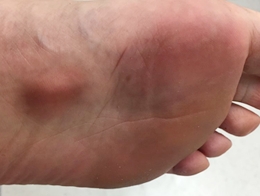Itchy Feet
Why do I have Itchy Feet?

The itch is really an unpleasant sensation, especially when it occurs in certain areas of the body which are sometimes tricky to reach and scratch, such as feet. Itchy feet can appear due to many different reasons, and if it persists for a long period of time, it can cause a great discomfort. Luckily, there is almost always a way to find out the cause of this condition and to take some measures, which will completely cure it or provide symptom relief. Here we will try to address as many causes of itchy feet as possible, to help you identify the significance of your symptoms, and to provide some advice on how to handle it in specific cases.
Causes of Itchy Feet
Causes of itchy feet are most commonly localized in the feet area, but these sensations can also appear because of some systemic disorders originating from other organs.
Fungus
Fungal infections are by far the most common cause of itchy feet. The fungus which is usually responsible for this is called Trichophyton, and the fungal infection of the feet is called Tinea pedis, usually known as Athlete’s foot. This fungus grows rapidly in a humid environment and it is frequently developing from wet shoes. Persons who spend most of the day in closed footwear, especially if they are physically active, are particularly susceptible to this condition.
Diabetes
Persons suffering from poorly managed diabetes mellitus are prone to various types of foot disorders, such as bacterial infections of the feet and toes. The most commonly isolated bacteria from diabetic foot are Staphylococcus aureus, Pseudomonas aeruginosa, and Proteus. These bacteria can cause inflammation of the affected areas of the feet and produce itching, along with other symptoms we will address a bit later.
Parasites and Insects
Other biological agents, such as parasites and insects can cause itchy feet, especially after walking outside barefooted. The itch is typically noticed after beach walk, as the parasites, insects, and even small jellyfish are present in the wet sand. Small foreign objects you step on while walking, such as crystals of glass are more likely to produce itch than pain.
Other Diseases
Besides diabetes, other systemic disorders can also cause itchy feet, such as kidney disease. Persons with lowered kidney function have increased levels of urea in their blood, which is a state called uremia. Urea then accumulates in various organs, including the skin, which can cause severe itching. This is a common symptom during the end-stage kidney disease. These persons almost always have joint pain, due to excessive swelling of the feet and lower legs.
Eczema
Dyshidrotic eczema is another possible cause of itchy feet. The exact cause of this condition has not yet been uncovered, but scientists think that it is based on some allergic reaction. Dyshidrotic eczema commonly occurs during summer, when there is an increased humidity level joined with increased temperature. Besides feet, this disorder can also affect hands and can be very itchy. During winter, dyshidrotic eczema rarely occurs, which mean that the sweat glands probably play an important role in its development.
Itchy feet during pregnancy
Some women experience itchy feet in pregnancy, especially during the third trimester. This condition is called obstetric cholestasis and it occurs due to mechanical pressure, which the fetus applies to the biliary system. If the normal flow of the bile is compromised, there can be an increased level of bile in the blood, which causes itching, usually in hand and feet areas.
Symptoms of Itchy Feet
- Many of the above mentioned causes of itchy feet can be recognized by noticing some other joined symptoms. For example, if you mostly experience itchy feet at night, it may be due to some biological causes (bacteria, fungi, parasites), as during the day, the itch is significantly suppressed by walking. Fungal and bacterial infections also come with a bad odor of the feet. Furthermore, bacterial infections can cause tissue damage and severe inflammation, which sometimes produces painful sensations.
- Persons with diabetes and kidney disease may experience tingling, pain, or numbness of the feet, due to peripheral neuropathy caused by long-term unmanaged blood sugar levels.
- If you notice blisters on your feet and hands, there is a great probability that you might have an issue with dyshidrotic eczema. This disorder may also appear with itchy hives, which partially confirms its suggested allergic etiology.
- In the majority of cases of itchy feet, some sort of rash will be present. Depending on the appearance of the rash, your dermatologist can often make a clinical diagnosis and spare time before starting the appropriate treatment. Itchy feet with no rash can be seen during uremia in patients with kidney disease. On the other hand, persons with diabetes will certainly have some skin changes joined with the itch, such as tight and thin skin which often peels eliminating a lot of dead skin cells.
- One of the issues we haven’t mentioned is also the itch associated with HIV infection. It may occur at any stage of the disease, but it is almost always associated with skin rash, which may also affect the feet and hands.
How to Get Rid of Itchy Feet?
Depending on the cause of the itchy feet, there are different treatments available. Antifungal creams and lotions are used to treat local infections caused by fungi. Bacterial infections may be simple, when topical creams containing antibiotics and corticosteroids may be enough, or complicated, in which case oral antibiotics are required.
For persons with diabetes, it is strongly recommended to keep blood sugar levels within the optimal range in order to prevent and decrease the changes of the feet associated with this disease. Similarly, patients suffering from kidney disease should do regular blood checks, so that their nephrologist can decide when it is the time for dialysis or kidney transplant. Addressing these underlying issues will automatically resolve the feet-related issues.
Home Remedies
Maintain Good Hygiene
Good hygiene of the feet is crucial, especially when it comes to fungal and bacterial infections. Every morning and every night before bed, you should soak your feet in warm water in order to eliminate the causative agents and the dead skin cells which they use as a substrate for reproduction. As said before, these microorganisms like humidity, so be sure to dry your feet well with a towel or a hair dryer after washing.
Baking Soda with Water
You can make a paste using two tablespoons of baking soda and water. Use this paste to cleanse your feet, especially the spaces between the toes where the fungi are the most probable to develop. High pH of the baking soda provides an unfavorable environment for the development of fungal infections.
Yogurt
Another great thing that you can use, and you probably always have it in your fridge is yogurt. Yogurt contains a broad spectrum of non-pathogenic bacteria, among which the most important one is Acidophilus. These bacteria take all the substrate for themselves, thus disabling the development of other, harmful pathogens. You can apply yogurt on your feet and massage your feet and toes with it every night before bed.
Sea salt
You can use the water solution of sea salt and soak your feet in it multiple times a day in order to relieve itching. This will remove the residual dead cells from your feet and toes and help your feet heal faster.
Unlike some topical creams, these home remedies are completely natural and it is safe to use them even in a toddler.





